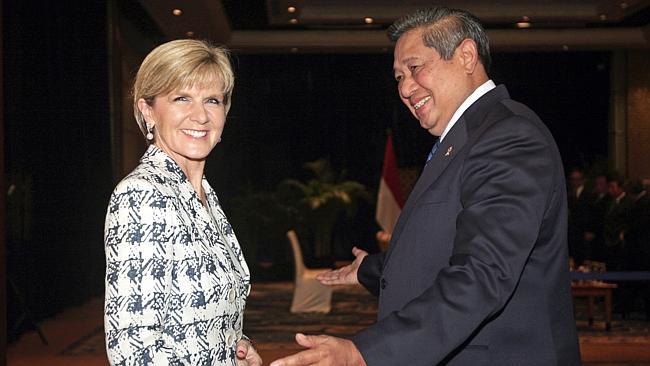Together again: Julie Bishop seals Jakarta pact
THE intelligence protocol Julie Bishop has signed with Jakarta is a significant victory for Australian diplomacy.

THE intelligence protocol Julie Bishop has signed with Jakarta is a significant victory for Australian diplomacy, ending the Indonesia spying row with a commitment to enhanced security co-operation while avoiding limits on legitimate intelligence-gathering.
The agreement eked out over nine months — the Foreign Minister offered a first draft in early December — is also a validation of outgoing President Susilo Bambang Yudhoyono’s drive to get a resolution and normalisation of the relationship before leaving office in October.
The Abbott government has emerged from the bitter spying row — in which Australian agencies were accused of gathering intelligence on the President and his inner circle in 2009 — with a stronger platform for intelligence co-operation than before the relationship was thrown into turmoil.
The Joint Understanding on a Code of Conduct, foreshadowed in The Australian last week and signed yesterday in Bali, imposes a broad restriction on activities harmful to either country’s interests, but also commits Australia and Indonesia to an enhanced intelligence relationship.
And though there was a high level of co-operation in some areas, notably counter-terrorism, before the dispute, the two governments have now agreed on regular meetings and consultations between chiefs of all their intelligence agencies.
“Not only are we going to back to where (the relationship) has been but as a matter of fact it will be even more enhanced in the future,” Foreign Minister Marty Natalegawa said yesterday following the signing.
Ms Bishop confirmed closer co-operation would include sharing intelligence to counter the domestic security threats of Islamic extremists returning to Australia and Indonesia from the conflicts in Syria and Iraq.
“We both believe that a strong intelligence partnership is vital for both countries and is the most effective way to defeat those who would do harm to the people of Australia and the people of Indonesia,” she said.
Labor, during whose term in office the Indonesian spying activity happened, welcomed yesterday’s pact, although deputy leader and foreign affairs spokeswoman Tanya Plibersek said: “We are disappointed it took the Abbott government so long to reach agreement with Indonesia.”
The foreign ministers signed the new intelligence protocol witnessed by Dr Yudhoyono, who had been working in the background for six months to bring the spying row to a close and curtail the bilateral damage.
Dr Yudhoyono, who with his wife and political confidants was targeted in an intelligence gathering operation by the Australian Signals Directorate, yesterday congratulated the Australian Foreign Minister on concluding the agreement. “Before I leave office, I was hoping personally we could go back to more strong relations,” he said.
The presidential mobile phone interception, never denied nor confirmed by the Abbott government, was one of three damaging spy claims involving Australian and US agencies that emanated from the fugitive US Defence Intelligence Agency contractor Edward Snowden.
In the months following the first disclosures in November, the controversy appeared to threaten serious damage to the broader Indonesia-Australia relationship.
Dr Yudhoyono suspended policing and intelligence co-operation and defence exercises with Australia and recalled ambassador Nadjib Riphat Kesoema.
However, the bans had been quietly eased on operational levels from early this year and Mr Nadjib returned to Canberra full-time in May. Policing co-operation had already returned to normal, despite another squabble over the Abbott government’s determination to turn asylum-seeker boats back to Indonesia.
Dr Natalegawa said yesterday’s agreement “restored in full” intelligence co-operation, and also removed any remaining barriers to military linkages. “With the signing of the code of conduct there will be a full restoration of communications between the armed forces of the two countries,” he said.
An extended period since the row began cooling about March has been occupied with finding a form of words for the protocol, or code of conduct, satisfactory to both governments. The Australians were anxious to avoid a lengthy, detailed and proscriptive document.
The final code of conduct, as the Indonesians want it known, boils down to three paragraphs and two broad commitments.
Australia and Indonesia “will not use any of their intelligence, including surveillance capacities, or other sources, in ways that would harm the interests” of the other; and they will “promote intelligence co-operation between relevant institutions and agencies in accordance with their respective national laws and regulations”.
The protocol comes into force immediately.


